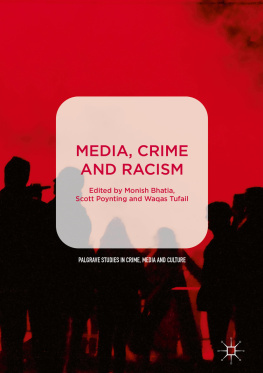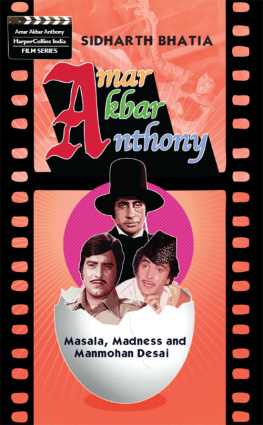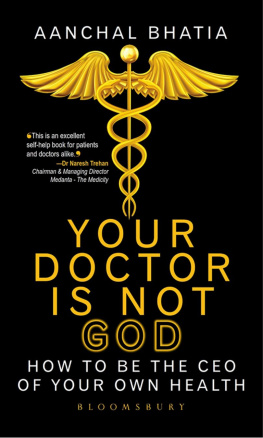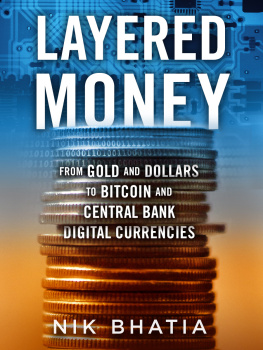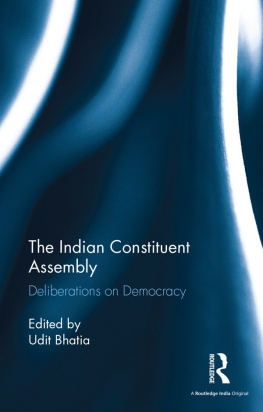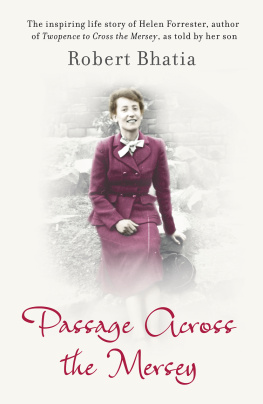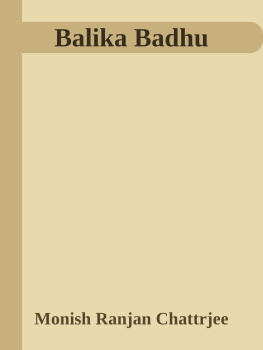1. Introduction
For the three editors, this volume marks the broadening out of a conversation that we began together some five years ago or more, about the relationship of the media to the racialisation of crime and the criminalisation of racialised others. We have learnt much from those who have here joined us in this conversation, and of course from those who have bequeathed us all the language and the terms of that conversation.
When we first began our correspondenceacross corridors, then between countries and continentswe were all three teaching university courses, primarily of a critical criminological nature, that dealt with the media in relation to racialisation and crime. We drew, in our teaching and our dialogue, on contemporaneous questions. These included how to make sense of the hundreds, thousands of asylum seekers perishing in the Mediterranean, portrayed widely in the media as opportunistic economic migrants, often with state violence exhorted against them, and at best strong social control of them as a problem. The illegalisation of boat people bound for Australia, and also media silence and silencing about unlawful state violence against them. These stories were not monolithic; the same media that can so effectively dehumanise and rationalise injustice can also humanise and demand justice. What of the resident immigrants represented as welfare scroungers and a drain on the economy? What of the purported crisis of multiculturalism? What of race riots, such as London in 2011 and Ferguson, Missouri, in 2014, both involving black deaths at the hands of the police, and occasioning much demonisation of rioters in the media, but also the increasing contention there that Black Lives Matter ? Racialised criminal gangs of various sorts? How is the war on terror constructed and prosecuted in the media, among other sites; how are (often criminal ) wars and warfare mediated? What is the nature of Islamophobia? How does racism intersect with gender relations in specific media reports and story cycles, such as racialised constructions of minority religious practices (e.g. veiling) or of sexual abuse? How is racism in the media resisted, and how is racism resisted in the mediaespecially the new social media? These were but a few of the questions we discussed with each other and with our students.
In such teaching, we found few publications, and very little in the way of books that dealt contemporaneously with all three factors: media, crime and racism. There were excellent books that dealt with media and crime, or media and racism, or racism and crime, but practically no recent books dealing explicitly and entirely with all three.
Eamonn Carrabine, in his generous foreword to this book, points rightly to the intellectual (and political) legacy that we have inherited from Policing the Crisis (Hall et al. ) for a perspicacious account of the scapegoating of the asylum seeker in Britain during neo-liberal dismantling of the welfare state.)
Yet projection is just one of the ideological manoeuvres performed by racism, of which there are abundant examples in this book. Another, related, working of racist ideology is what we might call a chutzpah effect. Look at a photograph of a lynching to see the dangerous black man in this light. Who is in danger here? Who is presenting the danger? Consider the depiction of indigenous peoples everywhere, dispossessed of their land, as beneficiaries of the largesse of the dispossessor. Similarly, in the case of Australian Aborigines, the most socially disadvantaged strata on just about any criterionlife expectancy, infant mortality, levels of formal education, income and wealth levels, housing standards, levels of arrest, conviction, incarceration, severity of punishment and deaths in custody as detailed in Chris Cunneens chaptertheir widespread portrayal as receiving special privileges! Note the representation of enslaved peoples as lazy; colonised peoples who have been robbed, cheated and extorted of their wealth and resources as themselves inclined to thievery and other criminality; colonised peoples subjected to rape and sexual exploitation as themselves sexually predatory; those subjected to the violence and barbarism of all forms of primitive accumulation, with its repertoire of mass murder and even genocide, kidnap and forced migration, concentration camps, torture and the whole panoply of state crime, as barbaric and uncivilised. Chutzpah is perhaps too gentle a metaphor for these workings of racist ideologies. More mechanistic, but serviceable, is Marxs and Engels notion of a camera obscura, in which real social relations are inverted in their (nevertheless real) appearances. Thus, who is perpetrating terror in the war on terror? The endangered white man so grieved for by the (violent and even murderous) neo-Nazi alt-right at Charlotteville, Virginia, as we write, is but the latest manifestation of this ideological operation of reversal of victim and perpetrator.
The moral panic model adapted from Stan Cohen and used to such insightful effect by Hall et al. () argue that, under these conditions, the Muslim Other , for instance, is one folk devil that is now globalised and continually recycled. To return to another, often badly travestied, notion of ideology as found in Marx and Engels (notably in The German Ideology ), the ideology of the ruling class prevails as the ruling ideology through their ownership and control of the means of ideological production; these days that is the internet above all. While masses of people, and perhaps soon most people, may own and operate a computer, laptop or tablet, or smartphone, they cannot own or control a major search engine or widespread social media platform. In as much as the ruling class benefits from deploying and manipulating racism, as sketched above, then we can expect the internet potential to talk back to be one-sided, if certainly not irresistible and eternal.
These are all reasons to return to questions of the relationships between the media, crime and racism some 40 years after Policing the Crisis . There is a new crisis and there are new media. The state, as well as the media and indeed some key forms of crime and criminalised activity, is now much more complicated by globalisation. Fake news has become a major political and cultural issue over the period of writing of this book; alternative facts were coined in the last year. Over the last days (as of writing this), US President Donald Trump has refused to denounce an apparent deliberate white supremacist killing perpetrated by driving a car into pedestrians as any form of terrorism, has declined to condemn neo-Nazis for their mob violence including probable homicide and has recommended on Twitter the dipping of bullets used to execute Muslim terrorists, as a (completely fictitious) tactic that he said worked for US General Pershing in the turn-of-the-century Philippines. The Twitter (and other social media and traditional media) exhortations, alternative facts and racist hate crime are causally connected in North America, but also in the British Isles, continental Europe, Australia and other places instanced in this book.
The book begins with an analysis of purported Asian and Muslim criminality as presented in mass media. In Chap. , Ulrike Vieten uses the case study of New Years Eve (2015/2016) Cologne sexual violence controversy in Germany and examines gendered anti-Muslim racism in media. Vieten closely scrutinises the media coverage and investigates the portrayal of victims and perpetrators and also sheds light on ways in which criminal investigators, courts and civil society in Germany dealt/deal with the issue of mass public sexual violence.

